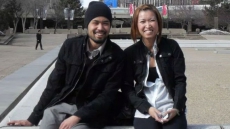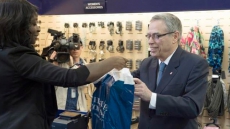TORONTO — Put a bunch of parents of young children together and bring up the topic of circumcision and — well, let's just say the discussion is sure to get lively.
"It's a very emotionally laden topic," agrees Dr. Jeremy Friedman, associate pediatrician-in-chief at the Hospital for Sick Children in Toronto.
"There's a few topics in pediatrics that whenever you talk with parents, it's never a mild conversation. People seem to have very, very strong feelings."
Some parents with no cultural or religious reasons to have their newborn son's foreskin removed will often question if the procedure is necessary or even advisable.
That's why the Canadian Paediatric Society (CPS) has updated its position statement on circumcision, to clarify the risks and benefits of both lopping off the foreskin or leaving it intact.
In its new policy statement released Tuesday, the CPS says it does "not recommend the routine circumcision of every newborn male."
While that basic advice has not changed since its previous statement in 1996, the CPS now says there can be good reasons for circumcision in certain cases.
"The main thing that has changed between now and then is there is convincing evidence that circumcision can actually prevent HIV," said Dr. Joan Robinson, a pediatric infectious disease specialist in Edmonton.
Removal of the foreskin can also reduce the incidence of urinary tract infections in young boys, prevent sexually transmitted pathogens like herpes simplex virus and human papillomavirus in older boys and adult males, while protecting against penile cancer.
"I think for most parents, it's basically a cosmetic procedure, unless you're part of a religion that insists that you have to have it done," says Robinson.
"We're simply saying that for parents who are for whatever reasons keen on having their son circumcised, there's now a little more evidence than there used to be about potential benefits."
Lindsay Ferris-McVey chose not to have her son Henley "snipped" after his birth late last year, although her husband is circumcised.
The 10-month-old is her second child — she has a two-year-old daughter, — and his was a no-epidural delivery at home, aided by a midwife.
"I felt that (not having) circumcision fit right in with that," she said from London, Ont., where she lives. "We're born the way we're supposed to be and for our society to decide you're not born properly just doesn't make sense."
Male circumcision as a cultural or religious ritual has been practised for thousands of years, but it became a neonatal medical procedure in Britain and North America in the late 19th century to promote genital hygiene, lower disease risk and to avoid having the painful, leg-crossing procedure later in life.
In the middle of the last century, most Canadian boys were circumcised as a matter of course. But over time, the circumcision rate steadily dropped to its current level of about a third of newborns.
Doctors recommend that circumcision be performed within the first week of life, as waiting until a baby is older increases the risk of complications like infection and bleeding, usually requires general anesthetic, and may be more painful.
That's not to say that infants don't feel pain — a common misperception, said Friedman. "There is a lot of good research these days that suggests there is definitely the ability to perceive pain, and therefore pain control is essential if you're going to do a procedure like a circumcision."
Typically, an infant is given a topical agent to numb the area, then an injection to block the nerve that supplies sensation to the penis, he said, noting that a soother dipped in sugar water can also help ease a baby's discomfort.
Circumcision is often performed before discharge from hospital or at specialized out-patient clinics. But because it's considered cosmetic, the $300-$500 surgery isn't covered by provincial insurance plans.
Jodi Rowe's 17-year-old son Jake was circumcised not long after birth and she had planned to have the operation for her youngest boy Trace, now 9. But because he was born with cerebral palsy, doctors advised against the surgery.
But Trace ended up being circumcised as a two-year-old because of recurrent penile infections, Rowe said from her home in Abbotsford, B.C.
"We had to make a decision because he was at risk for cancer because he had had six infections before 2. There were no more infections after that."
Shaw's advice to other parents: "Circumcise your boys. For the health of your child, get it done."
However, Michelle Ferreri suggests parents think twice before putting their sons through a procedure she likens to "mutilation" after watching it done to her elder boy Giorgio.
"They take a little five-day-old baby and they strap him down on a cold, stainless steel table," said Ferreri of Lakefield, Ont.
"He screamed, tortuous screams the entire time. Blood everywhere," she recalled. "He was miserable for three days after that — crying, crying, crying.
"They should really warn you. Every woman and every mom should see what they do before they make that decision, because it's very barbaric."
So when her second son Marcello was born, she opted against putting him through the operation.
Ferreri got a lot of grief over that decision, with friends wondering how the now eight- and five-year-old brothers would be affected because their anatomy doesn't look the same and one boy differs from their circumcised father.
"It was just the most ludicrous argument I ever heard ... Never once have they asked why their penises are different."
While circumcision has been found to cut the incidence of infections, particularly HIV, the risk of contracting the AIDS virus in Canada is "very, very low," compared to south Saharan Africa, where the disease is rampant, noted Friedman of Sick Kids.
Parents, he said, have to interpret the benefits in the context of the individual child.
"My advice to most of those families tends to be there really isn't a good medical reason to convince you to do it or convince you to not do it."
As long as the surgery is performed by people who are well-trained, in a setting with good hygiene practices and good pain relief, "it really is a very safe procedure with a very low risk of any real complications," Friedman says.
"I think the tricky part is interpreting how important it is for your son."





